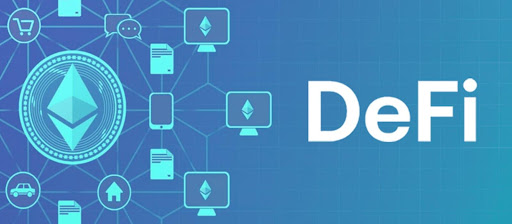Ethereum as a blockchain platform has seen unprecedented growth in the arena of decentralized finance and NFTs over the past few years. Ethereum has already seen real-life adoption over a variety of DeFi applications and this has made people wonder, why Ethereum and DeFi are synonymous with each other.
Well, we will try discussing the answer to this question in this article and even let you know how DeFi can transform our lives.
What is DeFi?
DeFi stands for Decentralized Finance, which is a collective effort made to bring financial products and services to anyone who is not covered under the ambit of traditional finance and banking systems. DeFi seeks to do a radical shift from Centralized Finance (CeFi) by engaging in blockchain-based peer-to-peer transactions. Anyone with an internet connection can be a part of the DeFi ecosystem and in any way, no centralized authorities can bar an individual from accessing the payment system using DeFi.
The older traditional banking systems which are slow due to dependence on human involvement and error-prone due to lack of automation can be easily replaced by DeFi. DeFi ecosystem lets you do a number of actions like payments and settlements, banking, lending, borrowing, and the issue of volatile cryptocurrency gets solved by the stablecoins.
How DeFi works?
DeFi is one of the fastest-growing sectors that is based on immutable and secured blockchain technology. DeFi applications function upon distributed networks or blockchain networks where all transactions made are on point and within the peers. Once a transaction is verified through the consensus mechanism, it is added to the immutable ledger.
DeFi conveniently replaces the banking institutions with smart contracts, which are automated and entrusted to transfer funds if certain conditions are met between the peers. The information in the blocks is secured by the means of encrypted keys or ‘asymmetric cryptography’ and the access is granted only subject to a unique identification. To find a user over the network public key can be used by peers, but to perform specific actions like authorizing a transaction on the DeFi blockchain network you need your private key. A private key also functions as a digital wallet, which lets you do actions like buying, selling, and sending cryptocurrencies.
DeFi lets a user remain anonymous, as it functions by the pseudo-anonymous addresses, but your address containing alphanumeric characters can be seen by peers.
How Ethereum and DeFi are synonymous with each other?
Ethereum since its launch has successfully established itself as the largest used blockchain network, while its native token holds the second largest place in the cryptocurrency market. Practically in the decentralized finance sector, all DeFi solutions use Ethereum Virtual Machine (EVM) for dApps, which literally translates to that they all communicate in Ethereum’s language. In this way, most of DeFi products work in the same tandem letting people lend tokens over one platform while exchanging an interest-bearing token over another dApp.
DeFi can offer this sort of complete freedom while letting users have control over their funds is possible through the Ethereum blockchain development.
Conclusion
DeFi aims to benefit billions of people around the world, but only if the wave of DeFi goes into the mainstream. A senior DeFi developer from Rejolut opines that DeFi not only just improves access for everyone to lend, borrow, trade, and invest, but also does risk management in a more effective way.
As of lately, there are number of newly emerged blockchain platforms that are trying to outpace each other in the crypto market and vying to take over Ethereum’s place. Since the ETH 2.0 rollout is announced, we can say that Ethereum will not only remain to be synonymous with DeFi but even be the undisputable king.








